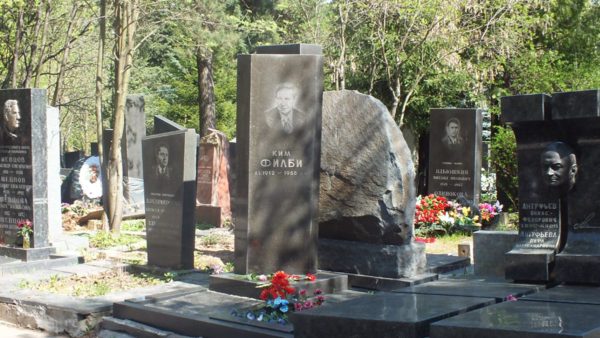The Spy Who Went Into The Cold (2014)
For those among us who are not old enough to remember the Cold War, it is nearly impossible to relate how tense of a time it was. The West felt a real threat from the Soviets, who were perceived as the only force as deadly as Hitler but one that had more men and materiel to expend, as well as nuclear weapons.
During that era, people in the West expected nuclear war at any minute, were used to daily reports of Communist expansion and the ensuing murders that are the trademark of the Left, and feared Soviet spies and fifth columnists (sleeper guerillas) concealed among us. In that time, Kim Philby stands large.
Philby is generally credited with destroying the gentleman’s network of intelligence services in the UK, since he was one of their own and betrayed them without detection. On a larger level, however, he showed the West its weakness: open societies reward contrarian behavior because it makes equal individuals feel as important as they think they should be, when not rewarded by life itself.
Harold Adrian Russell “Kim” Philby believed he should have been bigger than he was. Growing up in the shadow of a liberal father, Kim was never expected to make a mark on history like his father did, and was never as much of a success as he felt he deserved. As a result, starting at an early age, like the Baby Boomers to follow him, he got his revenge by one-upping his father and heading toward even more extreme liberalism.
The Spy Who Went Into The Cold — which is, quite surprisingly, a BBC production — gives a quick rundown of the Philby story and shows how devastating the revelation of his betrayal was. It does not give much biographical information, nor does it describe specific secrets, but instead focuses on the man and his behaviors, showing the personality that enabled deception.
In doing so, this film points two fingers: first, it finally says the “i” word (incompetence) about the efforts of not one but two British secret services in trying to trap this man, and shows where Herbert Hoover was right about him; second, it hints that the reason for his longevity as a double agent may have been the presence of someone else helping him, either Dick White or Nicholas Elliott, if one follows the hints of the film.
Every great film has a flaw, and for this film it is the focus on Philby’s later life, other than to point out that he drank himself to death in misery among the ruins of his idealized Socialist system, and skims over his early life. However, it is remarkably un-PC in that it shows the intersection of homosexuals, working class agitators, Jewish feminists and degenerate aristocrats who made this tragedy possible, and is unflinching in pointing out the horrors of Philby, the Soviets, and his fellow liberal traitors.
That aside, this film presents in an hour the basics of the intrigue behind the Philby affair, points out what a dysfunctional wreck of a human being Philby was, and identifies how by incompetence or treason the intelligence services allowed him to fly free. For an important but rarely referenced chapter of history, this is a great contribution that punches above its weight for its hour length.
Tags: bbc, cold war, dick white, espionage, herbert hoover, kim philby, nicholas elliott, the soviet union










